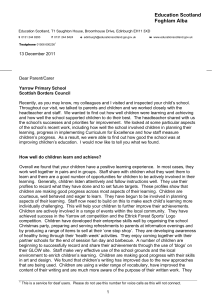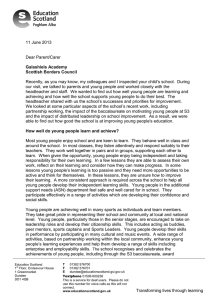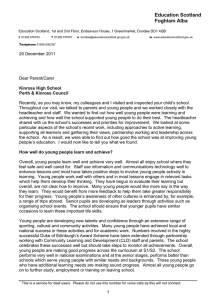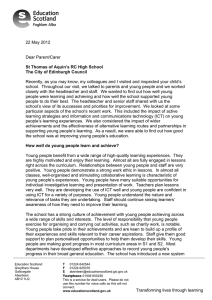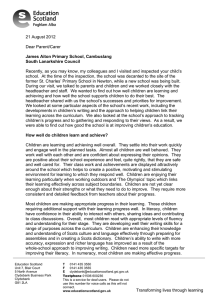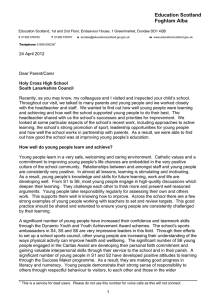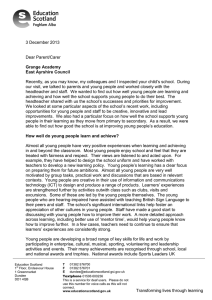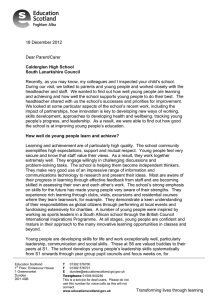26 November 2013 Dear Parent/Carer ’s school. During
advertisement
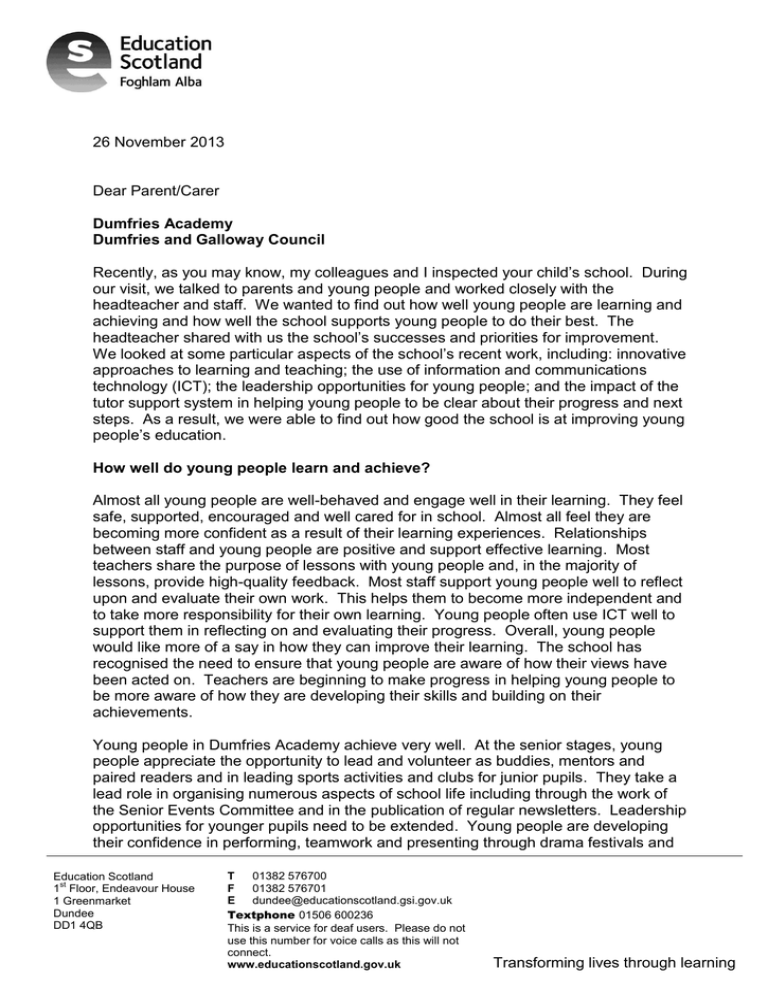
26 November 2013 Dear Parent/Carer Dumfries Academy Dumfries and Galloway Council Recently, as you may know, my colleagues and I inspected your child’s school. During our visit, we talked to parents and young people and worked closely with the headteacher and staff. We wanted to find out how well young people are learning and achieving and how well the school supports young people to do their best. The headteacher shared with us the school’s successes and priorities for improvement. We looked at some particular aspects of the school’s recent work, including: innovative approaches to learning and teaching; the use of information and communications technology (ICT); the leadership opportunities for young people; and the impact of the tutor support system in helping young people to be clear about their progress and next steps. As a result, we were able to find out how good the school is at improving young people’s education. How well do young people learn and achieve? Almost all young people are well-behaved and engage well in their learning. They feel safe, supported, encouraged and well cared for in school. Almost all feel they are becoming more confident as a result of their learning experiences. Relationships between staff and young people are positive and support effective learning. Most teachers share the purpose of lessons with young people and, in the majority of lessons, provide high-quality feedback. Most staff support young people well to reflect upon and evaluate their own work. This helps them to become more independent and to take more responsibility for their own learning. Young people often use ICT well to support them in reflecting on and evaluating their progress. Overall, young people would like more of a say in how they can improve their learning. The school has recognised the need to ensure that young people are aware of how their views have been acted on. Teachers are beginning to make progress in helping young people to be more aware of how they are developing their skills and building on their achievements. Young people in Dumfries Academy achieve very well. At the senior stages, young people appreciate the opportunity to lead and volunteer as buddies, mentors and paired readers and in leading sports activities and clubs for junior pupils. They take a lead role in organising numerous aspects of school life including through the work of the Senior Events Committee and in the publication of regular newsletters. Leadership opportunities for younger pupils need to be extended. Young people are developing their confidence in performing, teamwork and presenting through drama festivals and Education Scotland st 1 Floor, Endeavour House 1 Greenmarket Dundee DD1 4QB T 01382 576700 F 01382 576701 E dundee@educationscotland.gsi.gov.uk Textphone 01506 600236 This is a service for deaf users. Please do not use this number for voice calls as this will not connect. www.educationscotland.gov.uk Transforming lives through learning workshops, and music events. Groups of young people participate in outdoor learning giving them greater appreciation of the natural environment as well as the opportunity to learn new skills and recognise and manage risk when outdoors. Increasing numbers of young people are successful in having their skills recognised through awards such as Dynamic Youth Award and The Duke of Edinburgh’s Award. Young people participate in a range of sporting activities each week including a very successful and popular basketball club which helps to enhance their levels of physical activity and social skills. Young people value greatly the offsite trips and outings locally, nationally and internationally which enhance their understanding of what it is to be a global citizen. By the end of S2, the majority of young people are making good progress in most curricular areas. By the end of S4, young people’s attainment is improving in all measures and is consistently above national averages in all of the main national measures of attainment. By the end of S5 and S6, young people continue to achieve consistently better than, or in line with, the national average in all of the main measures. Young people with additional support needs are making good progress in their learning and achieve national qualifications in a range of subject areas. The proportion of young people who secure a positive destination on leaving school has been increasing and is now above both the local authority and national average. How well does the school support young people to develop and learn? Young people are well supported to achieve, develop and learn new knowledge, skills and attributes. In most lessons, the pace of learning is brisk and teachers provide appropriately challenging tasks which helps young people make effective progress. This is not yet consistent enough in all lessons across the school. In some lessons, tasks and activities need to be more stimulating and in a few lessons, teachers need to have higher expectations of what young people can achieve. In some lessons, teachers need to ensure that time is used more productively and take more consistent account of young people’s prior learning. Almost all staff in the school work well together to provide a very effective level of personal support for young people. Young people value the support they receive and appreciate the positive way staff respond to their learning needs. Young people with additional needs are well supported through a range of successful interventions, including in lessons. Staff with specific additional support remits play a significant role in supporting all young people across the school. The curriculum continues to evolve gradually since the school made the decision last session, to move on from presenting young people early for national qualifications in S3. Young people experience a broad general education and develop their knowledge and skills across all curricular areas in S1. They then specialise in some curricular areas at the end of S1. This means that many young people are making some choices before they have had enough experience of particular subjects to make informed decisions. Young people take part in cross-curricular projects in arts, creativity, health and wellbeing and technology. Some of this work needs to be planned better to ensure young people are making suitable progress. The school works well with a range of partners to enhance young people’s learning and to widen their experiences. The curriculum supports young people’s achievements well through, for example, the Junior Award Scotland in S2 and S3. From S1 to S3, the timetabling model means that young people are not experiencing sufficient learning in modern languages or religious and moral education. From S4 to S6, young people, including those with 2 additional support needs, are able to choose from an impressive range of courses which meet their diverse needs. This includes a good range of vocational options. All young people from S1 to S4 have at least two periods of physical education each week in line with national recommendations. Those in S5 and S6 also have two periods of physical education each week which helps to support their health and wellbeing development. The school should continue to monitor the arrangements for tutor time at all stages, and personal study in the senior phase, to ensure that best use is made of this time. The school has strengthened its curricular links with cluster primary schools to good effect through its work in science, health and wellbeing, numeracy and literacy. This is helping staff to share their understanding of standards and build greater confidence. How well does the school improve the quality of its work? The senior management team gives a very positive lead to improving the school’s work and, as a result, staff are focussed on providing the best learning experiences for young people. A significant number of staff are involved in groups to share best practice and benefit from professional learning with each other. Several staff have considerable expertise in leading on developments in national qualifications. More needs to be done to share this expertise across the school so that all staff and young people can benefit. The school has improved its approaches to tracking and monitoring young people’s progress and has been successful in bringing about greater consistency in learning and teaching. It now needs to strengthen further its approaches to tracking young people’s progress. In particular, staff need to take account of assessment evidence from a wider range of subject areas from S1 to S3. We have asked the school to involve partners more in evaluating its work. While it often gathers the views of parents and young people, it needs to respond to these views more regularly. Staff in all subject areas, including tutors, are reflecting on their practice. The school now needs to strengthen its approaches to evaluating its work. It needs to ensure planning for improvement has greater impact on young people’s learning experiences and achievements. This inspection found the following key strengths. Supportive and encouraging learning environment. Relationships between and amongst staff and young people. Partnership working to improve young people’s learning experiences and achievements. Staff commitment to career-long professional learning. Impact of the school’s work in improving transition arrangements. We discussed with staff and Dumfries and Galloway Council how they might continue to improve the school. This is what we agreed with them. Continue to develop the curriculum and ensure more consistently high-quality learning across all curricular areas. Ensure young people’s learning needs are met more effectively through more challenging learning activities and higher expectations of what can be achieved. Further improve approaches to self-evaluation to ensure continuing improvements. 3 What happens at the end of the inspection? We are satisfied with the overall quality of provision. We are confident that most of the school’s self-evaluation processes are leading to improvements. As a result, we will make no further visits in connection with this inspection. As part of its arrangements for reporting to parents on the quality of education, Dumfries and Galloway Council will inform parents about the school’s progress. Donald A Macleod HM Inspector Additional inspection evidence, such as details of the quality indicator evaluations, for your school can be found on the Education Scotland website at http://www.educationscotland.gov.uk/inspectionandreview/reports/school/primsec/Dum friesAcademyDumfriesandGalloway.asp If you would like to receive this letter in a different format, for example, in a translation please contact the administration team on the above telephone number. If you want to give us feedback or make a complaint about our work, please contact us by telephone on 0141 282 5000, or e-mail: complaints@educationscotland.gsi.gov.uk or write to us addressing your letter to the Complaints Manager, Denholm House, Almondvale Business Park, Livingston EH54 6GA. 4
